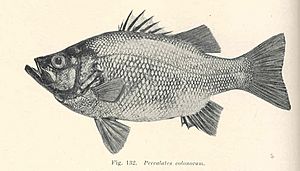Estuary perch facts for kids
Quick facts for kids Estuary perch |
|
|---|---|
 |
|
| Conservation status | |
| Scientific classification |
|
| Kingdom: | Animalia |
| Phylum: | Chordata |
| Class: | Actinopterygii |
| Order: | Perciformes |
| Family: | Percichthyidae |
| Genus: | Macquaria |
| Species: |
M. colonorum
|
| Binomial name | |
| Macquaria colonorum (Günther, 1863)
|
|
| Script error: The function "autoWithCaption" does not exist. | |
| Synonyms | |
|
|
Script error: No such module "Check for conflicting parameters".
The estuary perch (Macquaria colonorum) is a type of fish that lives in the waters of south-eastern Australia. It's a special kind of temperate perch. These fish love to live in brackish places. This means they like water that is a mix of fresh and salty water. You can find them in the lower parts of coastal lakes, rivers, and streams where the tide comes in.
Contents
What Does the Estuary Perch Look Like?
The estuary perch looks a lot like its close relative, the Australian bass. One small difference is that the estuary perch has a forehead that looks a bit more "scooped."
These fish can grow up to 75 cm (30 in) long. However, most estuary perch are usually around 40 cm (16 in) in length. The heaviest one ever reported was 10 kg (22 lb). But many people think this might have been a mistake, perhaps it was 10 lb (4.5 kg) instead.
How Do Estuary Perch Reproduce?
Estuary perch breed during the winter months. They do this at the same time as Australian bass. Female estuary perch are usually bigger than the males. They also become ready to breed at an older age and larger size than the males.
Sometimes, estuary perch and Australian bass have babies together. These mixed-species babies are called hybrids. Most of these hybrid fish can also have their own babies.
When and Where Do They Lay Eggs?
Estuary perch lay their eggs at the mouths of rivers, streams, and estuaries. This happens in winter and spring. The water temperature needs to be between 14 and 19 °C for them to breed.
In New South Wales, they usually lay eggs from July to August. In the western parts of Victoria, this happens later, from November to December.
About Their Eggs
The eggs of the estuary perch are tiny, about 1.3–2.4 mm (0.051–0.094 in) wide. They are not sticky and float easily in the water. After about 2 to 3 days, the eggs hatch into tiny fish called larvae.
How Long Do Estuary Perch Live?
Estuary perch can live for a very long time. Many other native fish in southeast Australia also live long lives. This is a way for them to survive. It helps make sure that most adult fish will be around for at least one very good breeding season.
These special breeding events often happen during very wet La Niña years. Such good breeding times might only happen every 10 or 20 years. The oldest estuary perch ever recorded lived for 41 years!
Fishing for Estuary Perch
The estuary perch is a very popular fish for people who enjoy fishing. It is especially popular in Victoria and New South Wales. In the past, people used large nets to catch these fish when they moved to breed in winter.
However, the number of estuary perch has been going down recently. Because of this, it is now against the law to catch them for commercial fishing. Also, there are sometimes limits on how many fish people can catch for fun. This helps protect the species.
 | Charles R. Drew |
 | Benjamin Banneker |
 | Jane C. Wright |
 | Roger Arliner Young |


